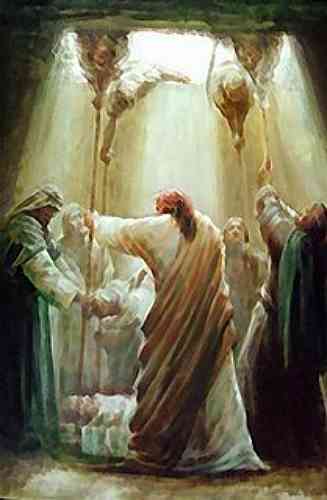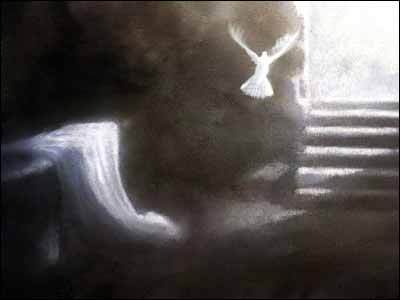
|
A Personal Testimony
|
by haRold Smith
a citizen of the Commonwealth (Ephesians 2:19) |
| With the very next car to stop and give me a ride, the driver began speaking about God |
It was not through eloquence of speech or any type of deep subject matter on his part that got my attention. In fact, I don't remember much of anything about that encounter except that every time he said "God" something resonated within me. I became more and more aware that God was indeed meeting me on my own terms. While I knew this event to be real with my heart, my mind was still unsure about what was happening. Getting his phone number with a promise to contact him later, I asked to be let out of the car. I was traveling with a hippie girl at the time and at this point, she was even more confused than I was. In no sense would she be considered a believer, but whenever she found herself at a loss, her method of dealing with the situation at hand was to extract a huge bible given to her by her mother from her purse (the kind you see on people's mantels in their homes), randomly open it to a page, close her eyes and point to a scripture. The amazing thing about this exercise was that, more often than not, it gave her something to hang onto. I don't know what translation she was reading from but this day, she began to read aloud and I will never forget the words that came from her mouth: "The man that you just passed on the road was Jesus!" She continued to read, but I was no longer cognizant of her words because I was aware that the atmosphere had grown incredibly electrified. In the middle of the day, without a cloud in the sky, the air had become charged similar to what happens just before lightening strikes (as a boy, I had been playing with a friend in our carport during a rainstorm when lightening visibly encircled us - while not struck, it made an indelible image on my memory). And then God began to speak to me. To this day, I can't tell you if it was an audible or inaudible voice - I just knew with every fiber of my being that God was speaking when He said,
| "Harold, if you want to know what power is all about, follow me and I'll show you power." |

|
| ...the power |
As I began to read His book, the Bible, He gave me eyes to see His Body - a dynamic, living presence. It spoke of something not seen with the naked eye because it is only seen in the spirit (Luke 17:20-21). It told me that the Kingdom is not contained in a building or organization because those who comprise His Body are the temple of the Living God, and that whenever two or more gather together in His Name, there He is (Matthew 18:20). It showed me that God's Kingdom is found within, not defined by a religious institution - not what has been come to be known as "the Church". It assured me that as I become part of His Body by embracing the example of His Life, His divine power has already given me all that I needed to know about life and godliness through my knowledge of Him (2Peter 1:3, 1John 4:17). It showed me that acquiring eternal life comes through knowing God, not a walk down somebody's formulistic aisle of utterances (John 17:3). In short, what I saw in the pages of the Book was not what I saw across the landscape of what was called "Christianity". Now, I didn't write the book - I just read it. As I began to point out these discrepancies to those I was around, I was dismissed as being unknowledgeable and inexperienced. Those to whom I was associated with began to take it upon themselves to re-educate me and to disciple me in the traditions they had been brought up with. Slowly, over the years, the power that had overwhelmed me in the beginning began to wane and the closeness of the Lord that had sustained me began to be replaced by what should or shouldn't be done or said based upon somebody else's interpretation of scripture. I became aware of the Son's admonition that the tradition of men brings to none effect the power of God (Mark 7:7, 13). The first dawning of this message began when my new wife (also new to the Lord) wanted to do "church" and asked me to take her to the local "happening" religious institution in town. As we settled into the crowded balcony with a full view of the resplendent sanctuary, she leaned over and asked me what spiritual significance was represented by the pulpit and its reference in scripture. I said, "Well, actually - none". In the same regard, she asked me about where to find the pews in scripture and why they were arranged the way they were; to which I tentatively answered, again - "none". She proceeded to go around the entire building and all of the proceedings unfolding below us one by one asking, essentially, where was the Lord in all this? When I was unable to advance a scriptural purpose for any of them, in her naivety she asked, "Well, then, why do we do them?" At the time, I didn't have an answer - but it began my quest to find out why.
There is an accounting in Genesis 11:1-9 describing the actions of some men. Scripture does not say these were evil men - as have been depicted by some traditional Christian views. They were probably like many today who just wanted to do something for God and felt they needed to protect what they had - they didn't want to be "scattered". How many times have we heard these words from well-meaning pastors who feel it their duty to "protect the flock"? It is pretty evident from the God's response to the actions of those men that He did not look upon these proceedings with high regard. I submit to you that the spirit prompting the actions of the men described in this passage from Genesis has not gone away. It can be seen in every neighborhood, particularly in America, where there are spires reaching to the heavens on the top of every religious institution built there and a plaque out in front that boasts a name other than the name of the Son. And, as referrred to earlier, someone inside that ediface standing behind an unscriptural podium declaring his function to be to "keep the flock from scattering." I also submit to you that God looks upon what man has accomplished in this venue today no differently than he did in the account in Genesis. I can not find religious institutionalism endorsed anywhere in the scriptures or the life of the Son and do not believe that God has sanctioned any of it. Indeed, the harshest words the Son ever uttered was to the religious leaders of his day as "vipers", shutting up the kingdom of heaven from those that are wanting to enter as well as themselves (Matthew 23). It must be understood that what is being referred to here is the inherent consequence of structural theology - not, necessarily, individuals caught up in the structure who are merely replicating what they have been taught. That structure, by its very nature, shifts the responsibility of the individual to "dig their own well" into the things of the spirit to the person or persons in charge of the institution. Paying someone to delve into the scriptures on behalf of others and report on their findings is not what God intended - ever. What He did intend was for each believer to become a high priest in his own right, equal with the Son who is the firstborn among many "brethren" (Romans 8:29); and as a high priest, to press into the inner chambers of the heart of God to find out who He says He is - not who we want Him to be.

|
|
...the tallit |
When every Hebrew boy turns 13 years of age, he becomes a bar mitzvah (literally - son of the commandment) and is obligated to begin to observe the commandments of Moses. While the occasion of becoming a bar mitzvah was only ritualized in the 15th century, it was the status of obligation in earlier Biblical times which placed the age of responsibility for boys at 13 (upon which the bar mitzvah is founded). At that time, he is given his first tallit - a prayer garment to be worn under the outer clothing. It has been customary to bury a male in the tallit which he had used during his lifetime, after its fringes have been deliberately rendered ritually unfit and is placed over the head of one who has died as they lie in their grave or tomb. That garment has fringes or strings on the corners called tzit-ziot or "lights" and, when not being used, the tallit is to be folded in a certain manner so that the lights all hang together from the same corner - something no Roman soldier would have known to do or how to perform it. Hence, Peter's understanding that Yeshua's body had not been taken by the Romans. What is notable about this same event described in Luke 24:12 has Peter "wondering in himself at that which was come to pass." Peter (as well as the other disciples) was not yet fully aware of all that was happening, but since he saw the tallit was properly folded and away from the rest of the clothes, he knew for certain the Romans had not taken His Master. When He arose from the dead, while still in the tomb, Yeshua removed the tallit from off his head, neatly folded it and laid it separately from the rest of His clothing - as He had done every day of His life from the time He was a boy, probably without thinking much about it because it had become second nature to him, a matter of habit.
What is significant about this one word, "napkin", is how it illustrates the lack of understanding a Greek mindset possesses when looking at scripture - and when looking at who He is in Truth (see my big, fat Greek Mindset PART 1 and PART 2 to find out what that is). Yeshua was and remains Hebrew. He never distanced Himself from His People - not even in death. Think on this - there is not, nor has there ever been, another race of people on the planet upon whom YHVH has declared, "These are My People." Romans 11 tells us that it is WE, the others, who have been grafted INTO the Commonwealth of Israel - not the other way around. It is BECAUSE of that Hebrew root THROUGH whom the Promise came, that enables all who will embrace His Life to come into the Presence of the Holy One of Israel today. It is our responsibility to find out Who He Says He Is in Truth and then follow that Truth - wherever it may lead to uphold our citizenship as Israelites, children of the Living Elohim.
| "And He came and preached peace to you who were afar off and to those who were near. For through Him we both have access by one Spirit to the Father. Now, therefore, you are no longer strangers and foreigners, but fellow citizens with the saints and members of the household of YHVH." Ephesians 2:17-19 |
The Power of God Series
Part One: The Power of God Part Two: Hearing His Voice Part Three: Arrows of Famine Part Four: the Godhead |
Please feel free to email me at harold@hethathasanear.com. While not claiming to have all
the answers, it would be an honor to partake with you of what Spirit is uncovering.